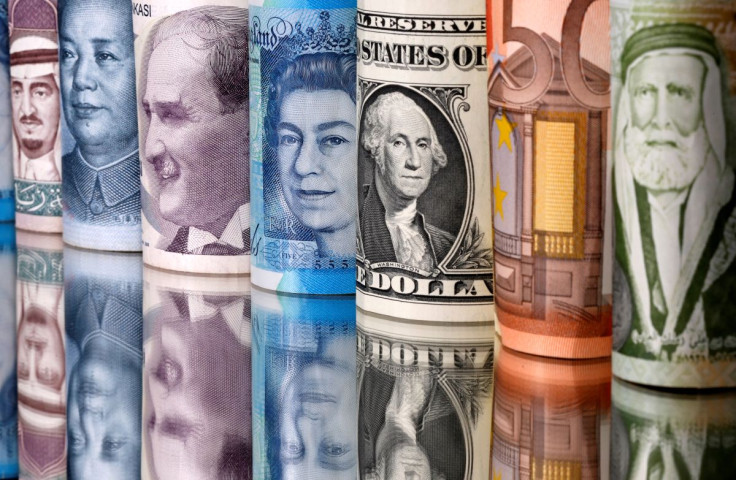Euro Pinned Down As War Stokes Stagflation Fears, Soaring Commodities Help Aussie

The euro was pinned near a 21-month low on Thursday by worries that Russia's invasion of Ukraine will hurt European growth, while commodity currencies hit multi-week highs as export prices surged.
The euro was last at $1.1097 in the Asia session, only a little above its overnight trough of $1.1058, its lowest since May 2020. It is down 1.5% for the week so far and is heading for a fourth consecutive weekly loss against the U.S. dollar.
The Australian dollar was holding firm at $0.7300, just off Wednesday's seven-week high of $0.7306, as prices for Australian exports such as coal, gas and grains soar on signs that sanctions against Russia are severely disrupting global supplies.
The euro is now down nine sessions in a row to a four-year low of A$1.5218 against the Australian dollar.
"In the current crisis, we view the euro's status as vulnerable," said senior FX strategist Jane Foley at Rabobank, which is reviewing its $1.11 target on the downside.
"On a corporate level there is web of complex relationships between the EU and Russian firms, particularly in the energy sector," Foley said.
"Energy prices have pushed higher as have those for many agricultural products. The war in Ukraine thus suggests higher for longer inflation and the potential of slower economic growth."
Euro zone inflation hit a record high of 5.8% last month, overnight data showed, surpassing expectations and prompting warnings from policymakers about stagflation.
Sterling has been tugged lower with the euro since Russia's invasion, although it managed a bounce from Wednesday's low of $1.3275 to trade at $1.341 in Asia.
Havens such as the yen and Swiss franc have been supported, though they dipped overnight with strength from the dollar and riskier currencies. The yen last traded at 115.67 per dollar. The U.S. dollar index sat at 97.502.
Federal Reserve Chair Jerome Powell said on Wednesday the central bank would begin "carefully" raising interest rates this month, but was ready to move more aggressively if needed - more or less the scenario traders have priced in.
BOMBARDMENT
Russian troops were in the centre of the Ukrainian Black Sea port of Kherson on Thursday, though Ukrainian officials said their forces were continuing to defend the city.
Other cities including Ukraine's second-biggest city, Kharkiv, continued to face shelling and bombing.
Brent crude futures jumped to a nine-year high of $118.22 a barrel.[O/R]
That surge and the Bank of Canada's first interest rate hike since 2018 pushed the loonie to a five-week high of C$1.2632 per dollar. It held steady near that level in Thursday trade.
A U.N. resolution reprimanding Moscow was supported by 141 of the assembly's 193 members. Heavy sanctions have hammered Russian assets and the rouble, which touched a record low of 110 per dollar in Moscow on Wednesday.
The rouble was a little firmer at 98 to the dollar in interbank trade outside Russia.
Eastern European currencies, meanwhile, have been walloped, with the Hungarian forint hitting record lows on the dollar and the euro overnight and the Polish zloty slumping to a two-decade trough. [EMRG/FRX]
The New Zealand dollar held near Wednesday's one-week top at $0.6779. Bitcoin edged lower to around $43,500 as an early-week bounce lost steam.
© Copyright Thomson Reuters 2024. All rights reserved.




















